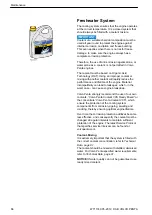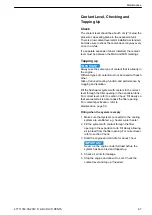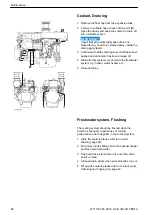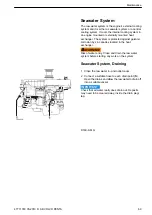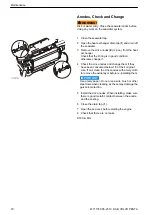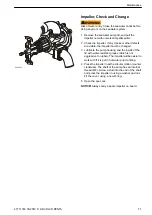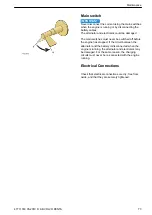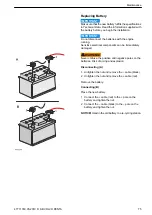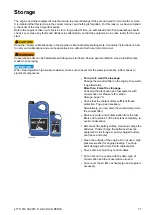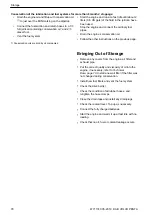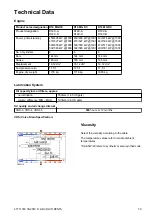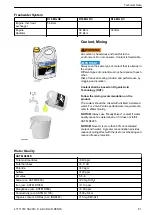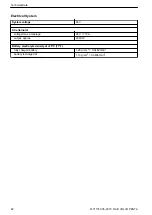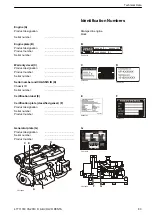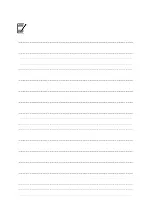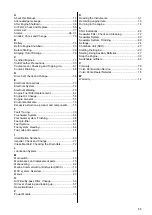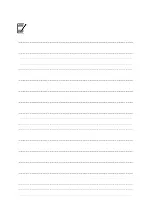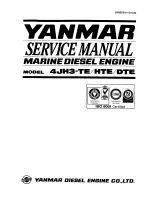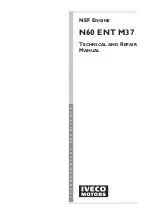
Fuel quality requirements for diesel engines
General requirements
Volvo Penta diesel engines are certified for compliance with emission legislations with the diesel test fuels
specified by law. These fuels correspond with diesel fuel standards EN 590, ASTM D975 and JIS K2204 and
paraffinic diesel fuel standard EN 15940. Volvo Penta engines will be compliance with emission legislation, if the
engine is maintained according to service instructions and used according to intended purpose.
It is the responsibility of the fuel suppliers to always ensure that their fuels meet relevant requirements and are
fit for their intended purpose. Their responsibility includes any use of additives for proper engine performance and
function.
Special requirements are placed on cold-flow properties, that is, temperature limit values of fuel filterability during
operation in winter conditions.
Restrictions for specified diesel fuels
•
Max density for ASTM D975 No 2–D: 860 kg/m
3
Insufficient density reduces the power and increases the fuel consumption. Excessive density endangers
the durability and function of the fuel injection equipment.
•
Max lubricity (wsd 1.4) for JIS K 2204: 460 μm
Sufficient fuel lubricity is essential to protect the fuel injection system against excessive wear.
Restrictions for other diesel fuels
Volvo Penta also approves the use of other diesel fuels as long as the here specified restrictions are followed.
However Volvo Penta does not guarantee compliance with emission legislation or fulfillment of expected lifetime
with these other diesel fuels.
NOTICE!
Operators must check permission for usage of these fuels according to regional, national or local
regulations.
•
Min cetane number: 40
An insufficient cetane number (“ignitability”) leads to poor startability and increased exhaust emissions.
•
Max density at 15°C: 860 kg/m
3
Insufficient density reduces the power and increases the fuel consumption. Excessive density endangers
the durability and function of the fuel injection equipment.
•
Viscosity between 1.9 to 4.6 mm/s
2
at 40°C:
Insufficient viscosity reduces the power and increases the fuel consumption. Excessive viscosity endangers
the durability and function of the fuel injection equipment.
•
Max lubricity (wsd 1.4): 520 μm
Sufficient fuel lubricity is essential to protect the fuel injection system against excessive wear.
•
Max FAME (biodiesel) content: 10% (V/V)
FAME is blended into diesel fuel.
•
Max sulfur content: 5000 mg/kg
Paraffinic fuels - HVO and GTL
Paraffinic diesel fuels (“Synthetic Diesel”) have higher cetane numbers and lower densities than diesel fuels. HVO
(Hydrotreated Vegetable Oils) is renewable paraffinic fuels. GTL (Gas-To-Liquid) is fossil paraffinic fuels. Volvo
Penta approves the use of paraffinic diesel fuels that complies with standard EN 15940. The fuel guarantees
compliance with emission legislation and fulfills the expected lifetime as long as the service requirements are
followed. Volvo Penta also approves the use of fuel blends between these paraffinic fuels and diesel fuels that
comply with the quality requirements.
Service requirements HVO and GTL
When shifting from diesel fuel to paraffinic fuel, the fuel hoses and sealings must be replaced.
Technical Data
80
47711740 05-2019 © AB VOLVO PENTA
Summary of Contents for D16
Page 1: ...Operator s manual D16 genset ...
Page 86: ......
Page 88: ......
Page 90: ...AB Volvo Penta SE 405 08 Göteborg Sweden www volvopenta com 47711740 English 05 2019 ...

